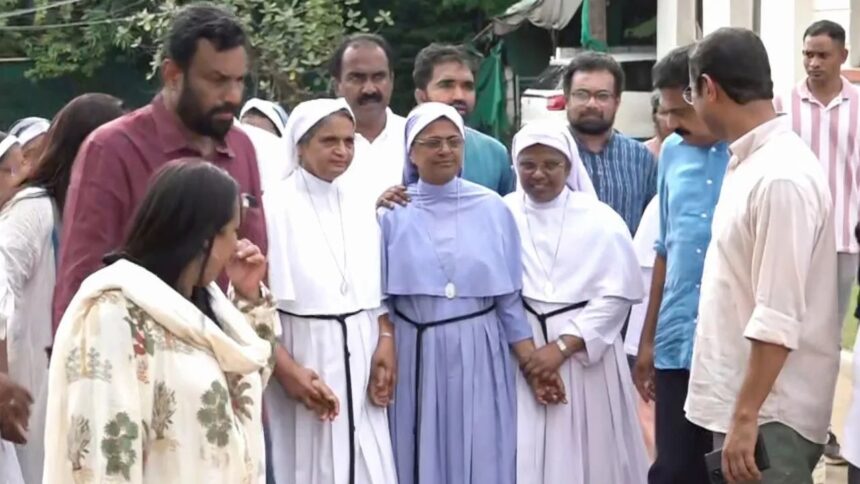Two Catholic nuns from Kerala—Sister Preethi Mary and Sister Vandana Francis—along with tribal woman Sukaman Mandavi, were granted conditional bail by a special National Investigation Agency (NIA) court in Bilaspur, Chhattisgarh, after spending nine days in judicial custody. The three were arrested on July 25, 2025, from Durg railway station while escorting three tribal women from Narayanpur district, allegedly for forced religious conversion and human trafficking.
Authorities had charged the women under Section 143(3) of the Indian Penal Code (related to human trafficking) and Section 4 of the Chhattisgarh Freedom of Religion Act, 1968. According to the police, the three tribal women were being taken to Agra for religious conversion under the pretext of offering them employment. However, the accused consistently maintained that the women were adults, possessed valid documents, and were voluntarily traveling for nursing jobs.
Granting bail on August 2, the NIA court noted the absence of strong evidence warranting continued detention. The court imposed several conditions: the accused must surrender their passports, each must furnish a bond of ₹50,000 along with sureties, and they are not to influence witnesses or tamper with evidence during the investigation.
The arrests ignited widespread outrage across India, particularly from Christian organizations, opposition parties, and human rights advocates. Archbishop Andrews Thazhath, President of the Catholic Bishops’ Conference of India (CBCI), welcomed the bail decision and urged the state government to drop the case entirely, calling the charges false and fabricated. Archbishop Mar Joseph Pamplany of Thalassery criticized the Chhattisgarh government for opposing the bail plea, stating that the arrests reflect targeted harassment against Christians. He also demanded intervention from the Union Government to prevent further misuse of anti-conversion laws.
Political leaders across party lines expressed strong reactions. Kerala Leader of Opposition V. D. Satheesan called the arrest politically motivated and questioned the prosecution’s opposition to bail without seeking custodial interrogation. CPM State Secretary M. V. Govindan described the case as part of a broader communal agenda and announced statewide protests on August 3 and 4. Meghalaya Chief Minister Conrad K. Sangma also wrote to Chhattisgarh Chief Minister Vishnu Deo Sai, expressing serious concern over the incident and seeking immediate redress.
While the Chhattisgarh police have stood by their actions, voices within the BJP have shown divergence. Union Minister George Kurian claimed that the BJP was the only party genuinely trying to resolve the issue, though his comments have reportedly led to friction within the Kerala unit of the party. BJP Kerala President Rajeev Chandrasekhar, who met with church leaders, described the arrests as a misunderstanding and emphasized that the central government did not oppose bail.
In Belagavi, Karnataka, approximately 400 Christians held a silent protest on August 2, decrying the arrest as an act of communal bias and demanding justice. Protesters submitted a memorandum to the district administration, asserting that the three women were traveling of their own free will and were not subjected to coercion.
Though bail has now been secured, legal proceedings in the case are still ongoing. The defense team has indicated that they will file for the quashing of the FIR. Meanwhile, statements from the three tribal women—who have reportedly confirmed they were not trafficked—are expected to be crucial to the outcome of the case.
This case continues to draw national attention and raises urgent questions about the implementation of anti-conversion laws, the treatment of religious minorities, and the rights of tribal citizens in India’s legal framework.





